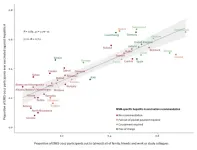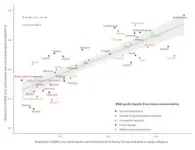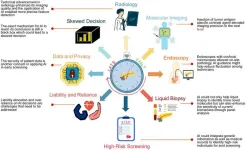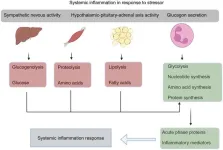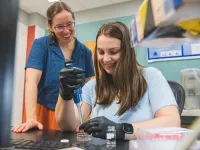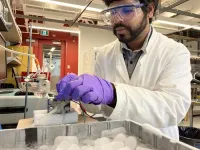(Press-News.org) Research analysing European survey data from 113,884 men who have sex with men (MSM) and published in Eurosurveillance indicates that while most MSM have a basic understanding of viral hepatitis, only 44% report having been vaccinated against both hepatitis A and B. The data highlight notable immunisation gaps despite available vaccination and recommendations. Strong public health support and creating an open environment that enables MSM to follow recommendations will be crucial to reduce outbreaks among MSM and eliminate hepatitis B.
Men who have sex with men are more likely to get infected with viral hepatitis, with risks being exacerbated by stigma and discrimination, which can affect access to healthcare services. While sex between men is the second most commonly reported route of acute hepatitis B virus infection in Europe, only three quarters of European countries (32/42) recommend vaccination against hepatitis B specifically for MSM. Outbreaks of hepatitis A have been reported among MSM worldwide, including a large multi-country outbreak in Europe in 2016–2018. However, just under half of European countries (19/43) recommend hepatitis A vaccination for MSM.
The two studies looked at data from 113,884 participants in the WHO European Region from the European MSM Internet Survey 2017 (EMIS-2017) with Brandl et al. analysing vaccination uptake data, and Burdi et al. reviewing basic knowledge about hepatitis A and B. EMIS-2017 was an anonymous, open access internet survey carried out between late 2017 and early 2018 on the sexual health of MSM. Both studies looked at data from respondents that were above the age of consent in their country, identified as cis or trans men, and indicated that they were attracted to men and/or had sex with men.
Vaccination uptake data
Brandl et al. reviewed data on self-reported hepatitis A and B vaccination status by age, education, financial coping, settlement size, openness about sexual orientation, migration history and diagnosis with hepatitis C or HIV. The study also compared these data against information on national hepatitis A and B vaccination recommendations [1].
Only 48% of respondents reported being vaccinated against hepatitis A, and 53% against hepatitis B, with significant differences in uptake between countries. Reported vaccination rates for either disease were higher among respondents that were more open about their sexual orientation (‘outness’), and in countries where vaccination for that disease was specifically recommended for MSM. Participants were more likely to report being vaccinated if they were older, living in bigger cities, more financially comfortable, or had been diagnosed with hepatitis C and/or HIV.
Basic knowledge on viral hepatitis
Burdi et al. looked at the basic knowledge on viral hepatitis and hepatitis vaccination, which may correlate with higher vaccination uptake [2]. Basic knowledge was defined as correctly identifying at least 4 out of 5 statements related to hepatitis in EMIS-2017. Researchers also collected data on sociodemographic characteristics, history of hepatitis C and/or HIV diagnosis, sexual orientation disclosure at the last sexually transmitted infection (STI) test, and outness.
While two thirds of respondents (68%) demonstrated basic knowledge, there was significant disparity among MSM in Europe. Respondents who were older, had a history of hepatitis C and/or HIV diagnosis, were out or had disclosed their sexual orientation at their last STI test were more likely to have basic knowledge. Knowledge was also higher among those who had been vaccinated against viral hepatitis or were immune due to a previous infection. Of the vulnerable, not vaccinated or immune respondents, 58% and 62%, respectively, reported not having been offered a vaccine for hepatitis A or B.
While there were national differences, individual factors played a larger role in reported knowledge levels about viral hepatitis.
Targeted public health action and supportive environment highly beneficial
Both studies highlight the importance of actively recommending vaccination against both hepatitis A and B to MSM, with Brandl et al. also pointing to the benefits of national recommendations for MSM and offering the vaccines for free or with a co-payment. Burdi et al. also suggest improving access to information among younger MSM in smaller settlements with a low level of education, and poorer financial resources.
Researchers for both studies emphasised the crucial role of a supportive, accepting climate to encourage openness, facilitate targeted public health action, and improve health outcomes for MSM.
[1] Brandl M, Schmidt AJ, Marcus U, Duffell E, Severi E, Mozalevskis A, et al. Self-reported hepatitis A and B vaccination coverage among men who have sex with men (MSM), associated factors and vaccination recommendations in 43 countries of the WHO European Region: results from the European MSM Internet Survey, EMIS-2017. Euro Surveill. 2024;29(45):2400100. https://doi.org/10.2807/1560-7917.ES.2024.29.45.2400100
[2] Burdi S, Brandl M, Marcus U, Duffell E, Severi E, Mozalevskis A, et al. Viral hepatitis knowledge and vaccination awareness among men who have sex with men (MSM) in 43 countries of the WHO European Region: results from the European MSM Internet Survey, EMIS-2017. Euro Surveill. 2024;29(45):2400099.
https://doi.org/10.2807/1560-7917.ES.2024.29.45.2400099
END
Men who have sex with men in Europe still vulnerable to hepatitis A and B, highlighting need for public health action and support
Research analysing European survey data from 113,884 men who have sex with men (MSM) indicates that while most MSM have a basic understanding of viral hepatitis, only 44% report having been vaccinated against both hepatitis A and B.
2024-11-07
ELSE PRESS RELEASES FROM THIS DATE:
Cancer genetic risk assessment guidelines expand to meet growing understanding of hereditary risk
2024-11-07
PLYMOUTH MEETING, PA [November 7, 2024] — The National Comprehensive Cancer Network® (NCCN®)—an alliance of leading cancer centers focusing on maintaining evidence-based expert consensus driven guidelines for care—announces the publication of the expanded NCCN Clinical Practice Guidelines in Oncology (NCCN Guidelines®) for Genetic/Familial High-Risk Assessment: Breast, Ovarian, Pancreatic, and Prostate. This closely follows the recent publication of the expanded NCCN Guidelines® for Genetic/Familial High-Risk Assessment: Colorectal, Endometrial, and Gastric.
Additional cancer types were added to the title and content for both guidelines. ...
Advances in screening and early diagnosis of pancreatic cancer
2024-11-07
Pancreatic cancer (PC) presents substantial diagnostic challenges due to its aggressive nature and lack of early symptoms, leading to late detection and poor prognosis. According to recent cancer statistics, PC ranks as the fourth leading cause of cancer deaths globally, with increasing incidence, particularly in high-risk regions such as China. Factors such as a shortage of specific and reliable screening markers, along with a lower prevalence in the general population, make effective large-scale screening a formidable tasko assess advancements in diagnostic techniques, artificial intelligence integration, biomarker discoveries, ...
Metabolic dysregulation and metabolite imbalances in acute-on-chronic liver failure: Impact on immune status
2024-11-07
Acute-on-chronic liver failure (ACLF) is a life-threatening condition characterized by acute deterioration of liver function in patients with pre-existing chronic liver disease. It is often accompanied by multiorgan failure and systemic inflammation, with high short-term mortality rates. The triggers for ACLF include bacterial infections, acute alcoholic hepatitis, and ischemic hepatitis, leading to the release of pro-inflammatory mediators. These systemic inflammatory responses result in immune dysfunction, contributing to the progression of the disease.
Recent research has emphasized the metabolic changes ...
Elite coaches see compassion as a path to better performance
2024-11-07
It may sound like a contradiction to talk about compassion in the competitive world of elite sport. After all, isn't elite sport all about becoming hardened to resistance and adversity?
But this is a false dichotomy, according to a new study that analysed the views of 12 Danish high-performance coaches on the use of compassion in their work with elite athletes.
In fact, there is a broad consensus among the coaches, most of whom are head of national teams, about the benefits of using compassion, says the study's lead author, Emilia Backman from the Department of Psychology, University of Copenhagen.
"All of the high-performance ...
Microplastics impact cloud formation, likely affecting weather and climate
2024-11-07
UNIVERSITY PARK, Pa. — Scientists have spotted microplastics, tiny pieces of plastic smaller than 5 millimeters, in some of the most pristine environments on Earth, from the depths of the Mariana Trench to the snow on Mt. Everest to the mountaintop clouds of China and Japan. Microplastics have been detected in human brains, the bellies of sea turtles and the roots of plants. Now, new research led by Penn State scientists reveals that microplastics in the atmosphere could be affecting weather and climate.
The study, published today (Nov 7) in the journal Environmental Science and Technology: ...
ECOG-ACRIN and PrECOG announce multiple presentations at ASH 2024
2024-11-07
Researchers with the ECOG-ACRIN Cancer Research Group (ECOG-ACRIN) and PrECOG, LLC, will present a variety of abstracts that aim to improve treatments for patients with lymphoma and acute leukemias at the 66th American Society of Hematology (ASH) Meeting & Exposition. The meeting is set to occur in San Diego, California, and virtually December 7 - 10, 2024.
Promising results from a phase 2 study (PrE0905) in patients with acute myeloid leukemia and new data from the practice-changing E1910 phase ...
Off-the-shelf thermoelectric generators can upgrade CO2 into chemicals. The combination could help us colonize Mars
2024-11-07
Readily available thermoelectric generators operating under modest temperature differences can power CO2 conversion, according to a proof-of-concept study by chemists at the University of British Columbia (UBC).
The findings open up the intriguing possibility that the temperature differentials encountered in an array of environments—from a typical geothermal installation on Earth to the cold, desolate surface of Mars—could power the conversion of CO2 into a range of useful fuels and chemicals.
“The environment ...
What makes human culture unique?
2024-11-07
Why is human culture — the shared body of knowledge passed down across generations — so much more powerful than animal cultures?
“What’s special about our species?” is a question scientists have wrestled with for centuries, and now a scientist at Arizona State University has a new hypothesis that could change the way we perceive ourselves, and the world around us.
“Ten years ago it was basically accepted that it was the ability of human culture to accumulate and evolve that made us special, but new discoveries about animal behavior are challenging these ideas and forcing us to rethink what makes our cultures, ...
Researchers discover dozens of new genes associated with disc herniations
2024-11-07
Lumbar disc herniation is one of the most common structural changes in the lower back and the most common cause of radiating pain, or sciatica, in the leg.
Hereditary risk factors for disc herniations were investigated in a recently published international study led by a University of Oulu research group, utilising data from FinnGen, the Estonian Biobank, and the UK Biobank. The study analyzed the genetic and health data of 829,699 participants.
The study found 41 novel regions of the genome that modify the disease risk for disc herniations, in addition ...
Research shows caterpillar fungus can slow down growth of cancer cells
2024-11-07
New research into a chemical produced by a caterpillar fungus that has shown promise as a possible cancer treatment has revealed how it interacts with genes to interrupt cell growth signals. The discovery is an important step towards developing new drugs for the treatment of the disease.
The research into a chemical produced by a caterpillar fungus has revealed how it may work as a cancer treatment. It interrupts the cell growth signals that are overactive in cancer, an approach that could be less damaging to healthy ...
LAST 30 PRESS RELEASES:
COVID-19 vaccination during pregnancy may help prevent preeclampsia
Menopausal hormone therapy not linked to increased risk of death
Chronic shortage of family doctors in England, reveals BMJ analysis
Booster jabs reduce the risks of COVID-19 deaths, study finds
Screening increases survival rate for stage IV breast cancer by 60%
ACC announces inaugural fellow for the Thad and Gerry Waites Rural Cardiovascular Research Fellowship
University of Oklahoma researchers develop durable hybrid materials for faster radiation detection
Medicaid disenrollment spikes at age 19, study finds
Turning agricultural waste into advanced materials: Review highlights how torrefaction could power a sustainable carbon future
New study warns emerging pollutants in livestock and aquaculture waste may threaten ecosystems and public health
Integrated rice–aquatic farming systems may hold the key to smarter nitrogen use and lower agricultural emissions
Hope for global banana farming in genetic discovery
Mirror image pheromones help beetles swipe right
Prenatal lead exposure related to worse cognitive function in adults
Research alert: Understanding substance use across the full spectrum of sexual identity
Pekingese, Shih Tzu and Staffordshire Bull Terrier among twelve dog breeds at risk of serious breathing condition
Selected dog breeds with most breathing trouble identified in new study
Interplay of class and gender may influence social judgments differently between cultures
Pollen counts can be predicted by machine learning models using meteorological data with more than 80% accuracy even a week ahead, for both grass and birch tree pollen, which could be key in effective
Rewriting our understanding of early hominin dispersal to Eurasia
Rising simultaneous wildfire risk compromises international firefighting efforts
Honey bee "dance floors" can be accurately located with a new method, mapping where in the hive forager bees perform waggle dances to signal the location of pollen and nectar for their nestmates
Exercise and nutritional drinks can reduce the need for care in dementia
Michelson Medical Research Foundation awards $750,000 to rising immunology leaders
SfN announces Early Career Policy Ambassadors Class of 2026
Spiritual practices strongly associated with reduced risk for hazardous alcohol and drug use
Novel vaccine protects against C. diff disease and recurrence
An “electrical” circadian clock balances growth between shoots and roots
Largest study of rare skin cancer in Mexican patients shows its more complex than previously thought
Colonists dredged away Sydney’s natural oyster reefs. Now science knows how best to restore them.
[Press-News.org] Men who have sex with men in Europe still vulnerable to hepatitis A and B, highlighting need for public health action and supportResearch analysing European survey data from 113,884 men who have sex with men (MSM) indicates that while most MSM have a basic understanding of viral hepatitis, only 44% report having been vaccinated against both hepatitis A and B.
